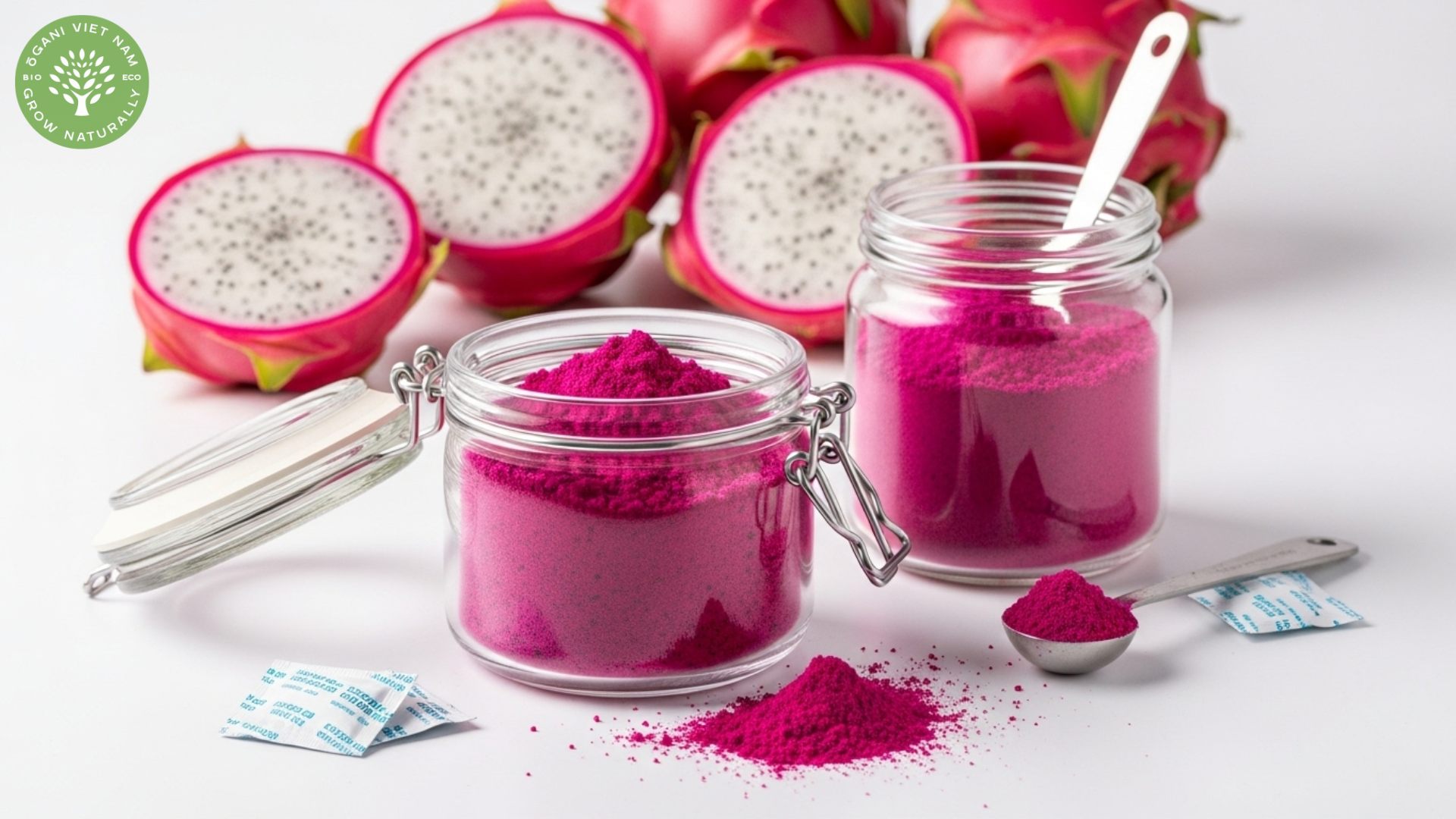
Dragon Fruit Powder Shelf Life Storage: Keep It Fresh and Clump‑Free
You can expect dragon fruit powder to stay fresh for one to two years if you store it right. For the longest shelf life, go with a freeze-dried powder—it lasts so well because almost all the moisture is removed.
A tip we swear by at Ogani VN is to keep it sealed tight in an airtight container, away from any heat or dampness. Doing this can actually help it last even longer, but if you store it poorly, you’ll easily cut that time short by months.
Dragon fruit powder shelf life storage expectations
When it comes to dragon fruit powder, how it’s made and packaged really determines how long it will last. Our top choice is often freeze-dried powder, which stays at its best for 15 to 18 months. The freeze-drying process does a fantastic job of removing moisture, which locks in nutrients and prevents spoilage.
The more common dehydrated powder is still a great option, typically lasting about a year if stored well. Here’s the key: freeze-dried powder has almost no moisture (under 5%), while dehydrated can hold a bit more. That small difference makes a big impact on shelf life.
Also, if you go for organic powder, you might notice its shelf life is a touch shorter because it’s free from artificial preservatives. We think that’s a worthy trade-off for a cleaner ingredient that often packs better flavor and nutrition. Knowing these details helps you make the best choice and store it properly for maximum freshness.
Proper dragon fruit powder shelf life storage conditions
Temperature and humidity control
To keep your dragon fruit powder fresh, store it in a cool, dry spot—ideally below 70°F (21°C). We recommend focusing on keeping the temperature steady rather than hitting a specific number. A pantry or cupboard away from spots like near the stove, a sunny window, or heating vents is perfect.
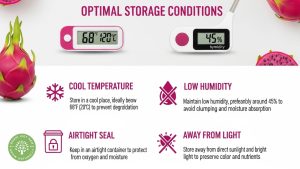
Keep your dragon fruit powder in a dry environment, as humidity is its main enemy. To prevent clumping and mold, aim for a humidity level below 60%. If you live in a particularly humid area, a simple trick is to toss a silica gel packet or two into the container with your powder. It’s an easy step that can save your powder—we’ve seen it happen too many times where a valuable batch is lost to moisture that could have been easily avoided.
Container selection and sealing
Don’t underestimate the power of an airtight container—it’s non-negotiable for keeping your powder fresh. You can’t go wrong with a glass jar that has a solid, tight-sealing lid, but a good quality plastic container with a reliable seal works just as well. Whichever you pick, here’s a quick tip: make absolutely sure the container is bone-dry before you pour your powder in. That one simple step makes all the difference.
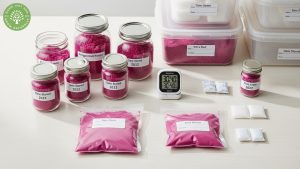
For the best protection, vacuum-sealed bags are fantastic. Just keep in mind they can be a bit fragile. We recommend placing the sealed bag inside a sturdy, rigid container for an extra layer of security. This two-layer method is your best bet for long-term storage.
Recognizing spoilage and quality deterioration
A quick visual and smell test is the easiest way to check your dragon fruit powder’s freshness. High-quality powder is a bright pink with a faint, sweet scent. If it’s starting to go bad, you’ll see the color become dull and brownish, and the smell will turn musty or just… off.
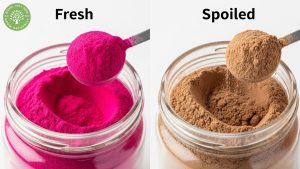
Trust your senses to spot when your dragon fruit powder is past its prime. Here’s what to look for:
· Clumping: A few small, soft clumps are usually okay to break apart and use. But if you find large, hard chunks, it’s a clear sign that significant moisture has gotten in, and it’s best to discard it.
· Mold: This is a definite red flag. If you see any fuzzy spots—white, green, or black—toss the entire container out immediately. Don’t try to scoop around it.
· Texture: Fresh powder should be fine and silky. If it feels sticky, gritty, or just has an unusual texture, it’s time for a new batch.
Extending dragon fruit powder shelf life storage
Smart portioning strategies
Here’s a simple trick to make your dragon fruit powder last longer: if you buy in bulk, divide it into smaller containers right away. Keep one small jar for daily use and store the rest sealed away. This way, you’re not constantly exposing your entire supply to air and moisture every time you open it.
Also, don’t forget to label each container! Write down the date you bought it and the “best by” date. It’s an easy habit that ensures you always use the oldest powder first, so nothing goes to waste.
Long-term dragon fruit powder shelf life storage in freezer
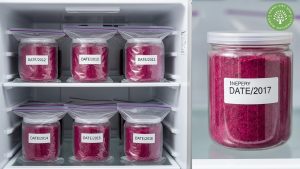
For long-term storage, freezing is your best option and can preserve your dragon fruit powder for 2-3 years. Here’s how to do it right:
· Use an airtight, moisture-proof container and always let the container come fully to room temperature before opening it. This stops condensation from forming and introducing moisture.
· Double-wrap your container in a heavy-duty freezer bag. Dragon fruit powder is porous and can easily absorb other food odors, which will affect its delicate flavor.Following these simple steps will ensure your powder stays vibrant and fresh-tasting for as long as possible.
Handling and usage tips
Always scoop your powder with a clean, dry spoon. Even a little bit of water on a wet spoon can create a damp spot that can spoil the entire batch.
And get into the habit of closing the container right after you use it. We know it’s easy to leave it open while you’re busy, but just a few minutes exposed to the steamy air of a kitchen can start to degrade the powder’s quality and color.
Frequently Asked Questions
How can I tell if my dragon fruit powder has gone bad?
Trust your senses.If the vibrant pink color has faded to a dull brown, if it smells musty or sour instead of faintly sweet, or if you see any visible mold, it’s time to toss it. Hard clumps or a strange texture are also clear warning signs. When in doubt, it’s safer to throw it out.
Is it okay to use powder that has clumped together?
It depends.If the clumps are small and break apart easily with a spoon, it’s generally safe to use—it’s just been exposed to a bit of air moisture. However, if the clumps are large, hard, or show any discoloration, the powder has likely started to degrade and should be discarded.
Does organic powder have a shorter shelf life?
Yes,typically. Because it’s made without synthetic preservatives, organic dragon fruit powder often has a slightly shorter shelf life (around 12-15 months) compared to conventional versions (which can last 15-18 months). We think the trade-off for a cleaner ingredient is worth it, and proper storage can help you get the most out of it.
Should I keep my opened powder in the fridge?
We don’t recommend it.The fridge is often a humid environment, and taking the powder in and out can cause condensation to form inside the container, which introduces moisture. A cool, dark pantry or cupboard is a much better spot.
What’s the real difference between a “Best By” and an expiration date?
A”Best By” date is the manufacturer’s estimate of when the product will be at its peak quality, flavor, and nutrient level. It’s not a hard safety deadline. Your properly stored dragon fruit powder can often be used for months after this date, though its color and potency might slowly begin to decline.
Maximizing your dragon fruit powder shelf life storage success
Keeping your dragon fruit powder fresh is straightforward. The secret is simple: protect it from moisture, heat, and air. By consistently managing these three factors, our customers at Ogani VN regularly enjoy their vibrant, high-quality powder for well over a year.
Feel ready to choose your perfect powder? Explore our collection of premium freeze-dried and organic options, all shipped with guaranteed freshness and clear storage guides. And if you have any questions or are considering a bulk order, our team is always here to help you make the best choice.
Read more:
- Dragon Fruit Powder Shelf Life Storage: Keep It Fresh and Clump‑Free
- Organic Dried Mango: Your Complete Guide To Healthy Snacking
- How to Store Dried Mango & Maximize Shelf Life (Pantry, Fridge, Freezer)
- Dried Mango vs Freeze‑Dried Mango: Nutrition, Texture & Best Uses
- How to Rehydrate Dried Red Dragon Fruit (3 Methods) + What to Make with It

